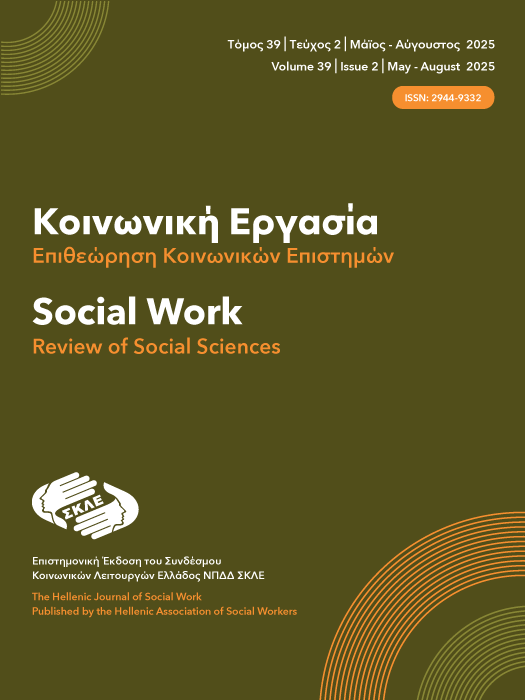Ο ρόλος των κατοικίδιων ζώων στα άτομα μεγαλύτερης ηλικίας: Μία διερευνητική μελέτη στον ελληνικό πληθυσμό

Περίληψη
Στη διεθνή βιβλιογραφία, τα κατοικίδια ζώα έχει φανεί πως διαδραματίζουν σημαντικό ρόλο στη ζωή των ατόμων μεγαλύτερης ηλικίας, επηρεάζοντας διάφορες πτυχές της. Ωστόσο, το πεδίο αυτό παραμένει σε μεγάλο βαθμό ανεξερεύνητο στο ελληνικό περιβάλλον. Η παρούσα μελέτη είχε ως σκοπό την εξέταση των διαφορών μεταξύ ιδιοκτητών κατοικίδιων και μη, σε σχέση με τη μοναξιά, την κοινωνική υποστήριξη και την κατάθλιψη. Συγχρόνως, εξετάστηκαν οι διαφορές στην προσλαμβανόμενη κοινωνική υποστήριξη ανάλογα με το αν το κατοικίδιο θεωρούνταν ισότιμο μέλος της οικογένειας. Επιπλέον, διερευνήθηκαν οι λόγοι απόκτησης κατοικίδιου, καθώς και οι ανάγκες που αυτό καλύπτει για τα άτομα μεγαλύτερης ηλικίας. Πρόκειται για μία διερευνητική μελέτη μεικτού ερευνητικού σχεδιασμού, στην οποία συμμετείχαν 100 ενεργά μέλη των Κέντρων Ανοικτής Προστασίας Ηλικιωμένων (ΚΑΠΗ) Πατρών, ηλικίας άνω των 60, χωρίς γνωστικά ελλείμματα. Οι συμμετέχοντες είχαν μέση ηλικία 75,14 ± 7,18 έτη (76% γυναίκες; 38% κάτοχοι κατοικίδιων). Η ανάλυση έδειξε ότι δεν υπήρχαν στατιστικά σημαντικές διαφορές στην κατάθλιψη. Ωστόσο, οι κάτοχοι κατοικίδιου παρουσίασαν σημαντικά υψηλότερα επίπεδα κοινωνικής μοναξιάς και χαμηλότερα επίπεδα κοινωνικής υποστήριξης από φίλους. Αντιθέτως, όσοι θεωρούσαν το κατοικίδιό τους ισότιμο μέλος της οικογένειας τους ανέφεραν υψηλότερη κοινωνική υποστήριξη από την οικογένεια και τους σημαντικούς άλλους. Οι κύριοι λόγοι απόκτησης κατοικίδιου ήταν η μοναξιά και η απόκτηση του λόγω της υπόλοιπης οικογένειας, ενώ η κυριότερη ανάγκη που αυτό κάλυπτε για τα άτομα μεγαλύτερης ηλικίας ήταν η συντροφιά. Η παρούσα μελέτη κατέληξε στο συμπέρασμα ότι τα κατοικίδια διαδραματίζουν σημαντικό ρόλο στη ζωή των ατόμων μεγαλύτερης ηλικίας. Ωστόσο, απαιτούνται περαιτέρω μελέτες προτού προχωρήσει η επιστημονική κοινότητα σε πρακτικές εφαρμογές.
Λεπτομέρειες άρθρου
- Πώς να δημιουργήσετε Αναφορές
-
Σαλάχας Α., & Μέντης Μ. (2025). Ο ρόλος των κατοικίδιων ζώων στα άτομα μεγαλύτερης ηλικίας: Μία διερευνητική μελέτη στον ελληνικό πληθυσμό. Κοινωνική Εργασία. Επιθεώρηση Κοινωνικών Επιστημών, 39(2), 54–68. https://doi.org/10.12681/socialwork-rss.41174
- Τεύχος
- Τόμ. 39 Αρ. 2 (2025): 2/2025
- Ενότητα
- Άρθρο

Αυτή η εργασία είναι αδειοδοτημένη υπό το CC Αναφορά Δημιουργού – Μη Εμπορική Χρήση – Παρόμοια Διανομή 4.0.


